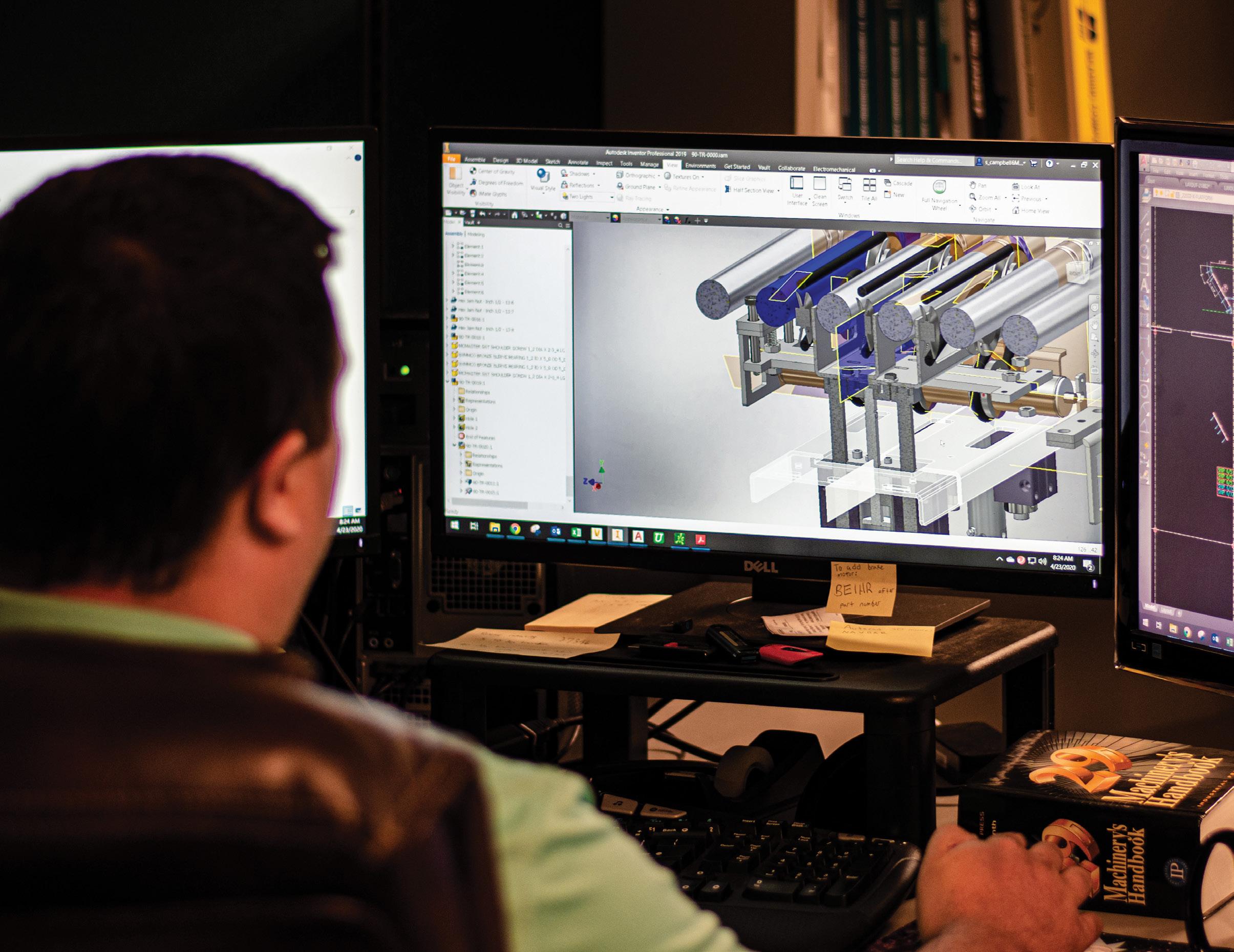
4 minute read
Sentry Equipment Stakes Reputation on Customized Service
From its Bedford HQ, company eyes overseas markets for its conveyor systems
FOR THE PAST FOUR DECADES, Sentry Equipment and Erectors, Inc. has fostered a reputation for delivering quality conveying systems and service to customers in all 50 states. Now the company is aiming to expand its reach into the rest of the Americas and beyond.
Upon its founding by conveyor industry veteran Adam Vinoskey in 1980, Sentry initially focused on the design and installation of machinery used in the bottling industry. The company has expanded continuously ever since, and employs 265 people today at its headquarters in Bedford County in the Lynchburg Region in an industry it helped establish.
With roughly 200 companies supporting the conveyor industry, the Lynchburg Region is known throughout the soft drink and beverage industry as the unofficial “Conveyor Capital of the World.” Sentry is one of many Lynchburgarea companies that traces its roots back to Simplimatic, Vinoskey’s former employer and one of the first conveyor businesses in the region.
Founded in 1965, Simplimatic built a competitive advantage by providing custom conveyor designs in an industry that had typically sold its products in as-is fashion. The company expanded and spawned several spinoffs and, over time, the cluster of conveyor businesses in the area has helped build a strong workforce pipeline in a region heavy on manufacturing. Manufacturing is second only to healthcare in total employment in the Lynchburg Region.

GREG GOFF Vice President of Sales, Sentry Equipment and Erectors, Inc.
After founding Sentry as a mechanical installation group, Vinoskey quickly recognized the need to be able to manufacture small parts to support the installation business. From there, the company slowly began manufacturing sections of conveyor before expanding to produce conveyor to support entire projects.
“We can design a conveyor system for anything that’s in a can, bottle, or box,” said Greg Goff, Sentry’s vice president of sales. Today, Sentry provides new or upgraded conveyance — defined essentially as equipment that can pack, pallet, handle, ship, unpack, and clean anything from bottles of soft drinks to perishable foods in numerous sizes. A partial list of corporate and business clients includes Coca-Cola, Keurig Dr Pepper Inc., Nor-Cal Beverage Co., The Boston Beer Company, Inc., Refresco Co., Vinton Packaging Group, Inc., and G.A.F. Seelig, Inc.
Sentry’s staff includes electrical and sales engineers in addition to line workers and other employees, along with a six-person research and development team. While overseas suppliers provide the company with raw materials, the design and assembly take place entirely in the same building the company has occupied for the last 21 years.
The company began its international expansion effort roughly a year ago and has engaged in conversations with potential clients in Canada, Mexico, and Chile. Helping international clients understand Sentry’s manufacturing

Sentry Equipment and Erectors, Inc., Bedford County
capability has been a challenge. Through the Virginia Leaders in Export Trade (VALET) program, VEDP has provided the company with introductions to professional contacts that have assisted in clarifying the ins and outs of doing business beyond U.S. borders.
Another difference is that other countries, particularly in Europe, do not necessarily follow the same formula that Simplimatic developed. Those companies tend to hire firms that provide everything a company would use on a complete line before turning over control. Sentry chooses to target its approach in a manner Goff says could save money for prospective clients.
“Tell us where you want us to start and where you want us to end — that’s pretty much our responsibility,” Goff said. “It’s going to take time to find the right people and the right companies.”
The company views this more as an opportunity than a challenge. Not every company, domestic or international, can afford to embark on a turnkey upgrade. Goff cited a hypothetical scenario in which a company wants to put in a new line for conveying cans. Most European firms would quote a price for the total package ranging somewhere in the neighborhood of $25 million. Sentry would only build what the client specifically needs, and leave it to that client to assume the costs for anything else.
“We pride ourselves on the fact that we’re not just looking at doing a complete system,” Goff said. “We’ve had customers come to us for one unique section of a conveyor belt that really needed to be designed a certain way.”
More than 80% of Sentry’s domestic business comes from return customers, Goff said. He cites one company that came to them 12 years ago, needing only a 25-inch section of a conveyor — by all definitions, a small project that would offer only a modest profit, but one that eventually became a multi-million-dollar customer.
Ultimately, Sentry’s commitment to service remains its chief objective — one that he and his colleagues believe will pay off as the company looks to expand overseas.
“Somebody always can offer something faster and cheaper than we can,” Goff said, “but nobody can give you the service and quality that we do.”




